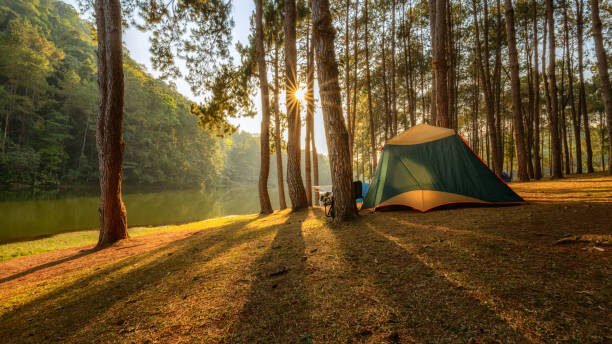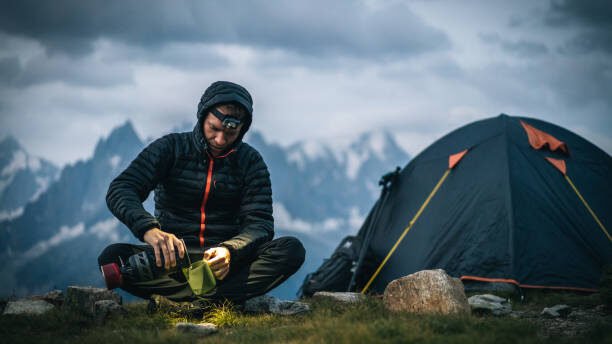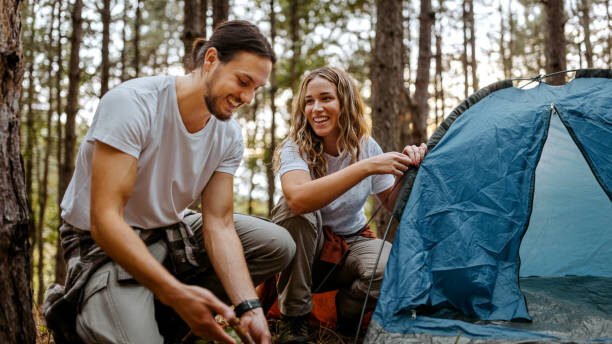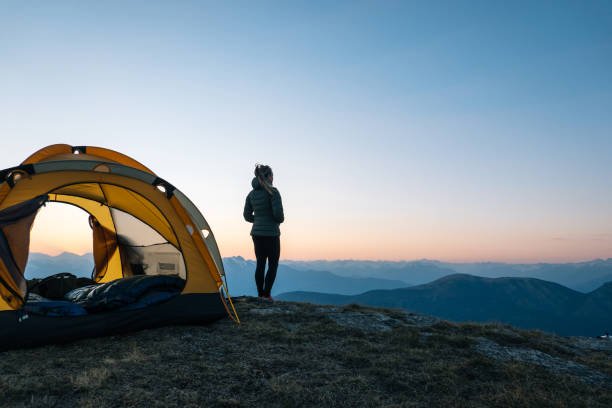Contents
Solo Camping vs. Couple Camping: Pros & Cons of Each
Camping is a popular outdoor activity that offers a break from the hustle and bustle of everyday life. Whether you choose to go solo or with a partner, each experience has its unique set of advantages and challenges. This article explores the pros and cons of solo camping vs couple camping to help you decide which option is best for your next adventure.

Solo Camping
Solo camping is an exhilarating and transformative experience that allows you to fully immerse yourself in nature while discovering your own capabilities and strengths. Whether you are seeking solitude, personal growth, or simply an escape from the everyday grind, solo camping offers a unique opportunity to connect with the wilderness on your own terms. Here, we delve into the various aspects of solo camping, exploring its benefits, challenges, and tips for a successful solo adventure.
Pros of solo camping:
- Complete Freedom: One of the most appealing aspects of solo camping is the complete freedom it affords. Without the need to compromise or coordinate with others, you can plan your trip according to your own preferences. You can choose your destination, set your pace, and make spontaneous decisions about where to go and what to do.
- Personal Growth: When camping alone, you face and overcome challenges on your own, which fosters a sense of accomplishment and resilience. This experience can help you develop problem-solving skills, enhance your resourcefulness, and build mental toughness.
- Deep Connection with Nature: With no distractions, you can fully immerse yourself in the sights, sounds, and smells of the natural world. This deep connection can be incredibly rejuvenating and provide a sense of peace and clarity that’s hard to find in everyday life.
- Flexibility: Solo camping means you can adapt your plans easily. If you discover a beautiful spot that you want to explore further, you can change your plans without needing to consult or compromise with anyone else.

Challenges of Solo Camping
- Safety Risks: Camping alone inherently comes with increased risks. Without a partner to assist in emergencies, you must be well-prepared for potential dangers such as injuries, encounters with wildlife, or sudden changes in weather. It’s crucial to have a solid understanding of survival skills and to carry a well-equipped first aid kit.
- Loneliness: One of solo camping challenges is loneliness. Extended periods of solitude can sometimes lead to feelings of loneliness. This is especially true if you are used to social interactions and the company of others. It’s important to be mentally prepared for this aspect of solo camping and to find ways to stay engaged, such as reading, writing, or exploring.
- Increased Responsibilities: When camping alone, all tasks fall on your shoulders. From setting up camp and cooking meals to navigating and ensuring safety, the responsibility can be physically and mentally demanding. This can be tiring, especially after a long day of hiking or exploring.
- Limited Shared Experiences: Solo camping means you miss out on sharing the beauty of nature and memorable moments with someone else. The absence of companionship can sometimes make the experience feel less rich and fulfilling, especially when encountering breathtaking views or thrilling moments.
Couple Camping
Couple camping offers a wonderful opportunity to escape the everyday routine and spend quality time together in nature. Whether you’re an experienced camper or trying it for the first time, camping as a couple can be a deeply rewarding experience that strengthens your bond and creates lasting memories. Here, we explore the benefits, challenges, and tips for a successful couple camping trip.
Pros of Couple Camping
- Shared Responsibilities: One of the most significant advantages of camping as a couple is the ability to share tasks. Setting up the tent, preparing meals, and gathering firewood become much easier and more enjoyable when you can divide the work. This shared effort allows you to relax more and focus on enjoying your time together.
- Enhanced Safety: Having a partner with you in the wilderness increases safety. In case of emergencies, there is someone to provide help or seek assistance. Additionally, having another person around can make you feel more secure when camping in remote areas.
- Bonding Experience: Spending uninterrupted time together in nature can strengthen your relationship. Whether it’s navigating trails, solving problems, or simply enjoying the beauty around you, these shared experiences can deepen your connection and create a strong sense of teamwork.
- Shared Joy: Experiencing the wonders of nature together can be incredibly fulfilling. Watching a sunset, stargazing, or discovering a hidden waterfall can be even more special when shared with a loved one. These moments create cherished memories that you can look back on together.

Challenges of Couple Camping
- Compromises: Camping with a partner requires compromises. You might need to adjust your plans, pace, and activities to accommodate each other’s preferences and comfort levels. This could mean choosing easier trails, altering your schedule, or making other adjustments to ensure both of you have an enjoyable experience.
- Potential Conflicts: Spending extended periods together in a challenging environment can sometimes lead to disagreements. The stress of setting up camp, dealing with unexpected situations, or simply being in close quarters can test your patience. Effective communication and a sense of humor are essential to navigate these moments.
- Less Solitude: While the presence of a partner adds companionship, it also means less time for personal reflection and solitude. If you’re someone who enjoys solitude, you might miss the opportunity for quiet introspection.
- Coordination Challenges: Planning a trip for two involves coordinating schedules, agreeing on destinations, and aligning expectations. This can sometimes be challenging, but clear communication and mutual understanding can help ensure a smooth and enjoyable camping trip.
Final Thoughts
Choosing between solo and couple camping depends on what you want to gain from your adventure. Solo camping is perfect for those seeking independence, personal growth, and a deep connection with nature. It’s an opportunity to challenge yourself and find peace in solitude. On the other hand, couple camping offers shared responsibilities, increased safety, and the joy of experiencing nature with a loved one. It’s a chance to strengthen your bond and create cherished memories together.
Both experiences have their unique pros and cons, and your decision should be based on your personal preferences, goals, and the type of experience you seek. Whether you choose to embark on a solo journey or a shared adventure, camping promises to provide a fulfilling and enriching experience.


